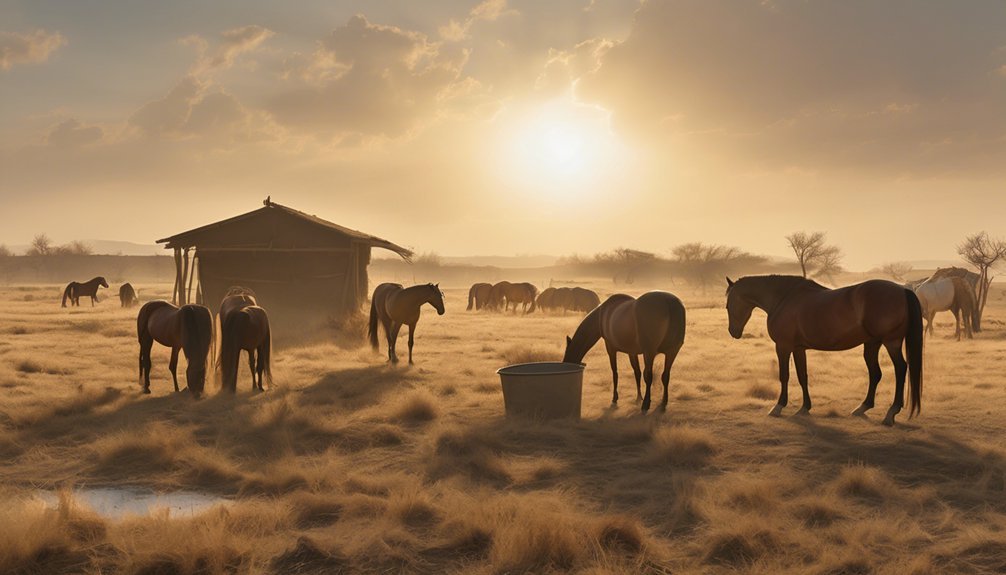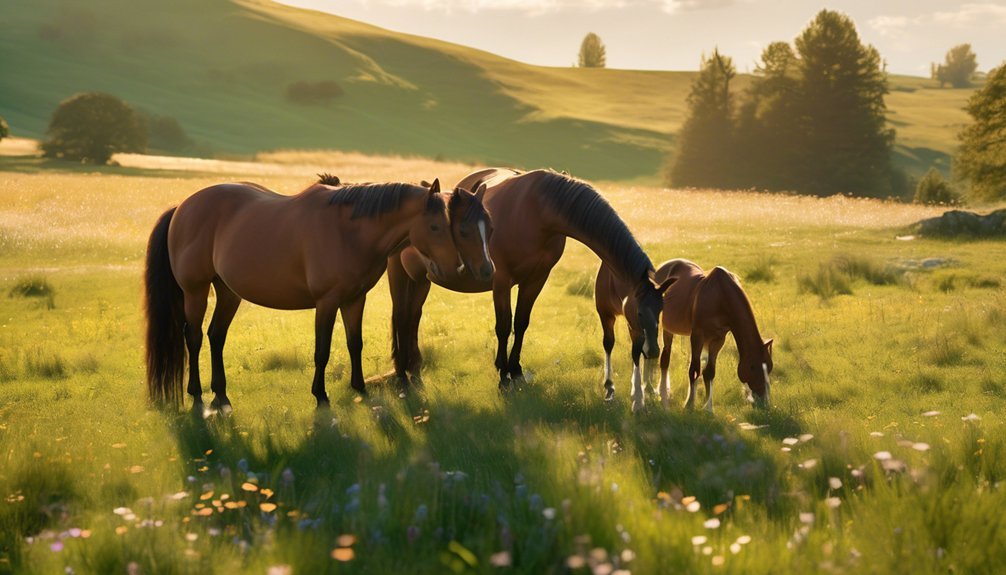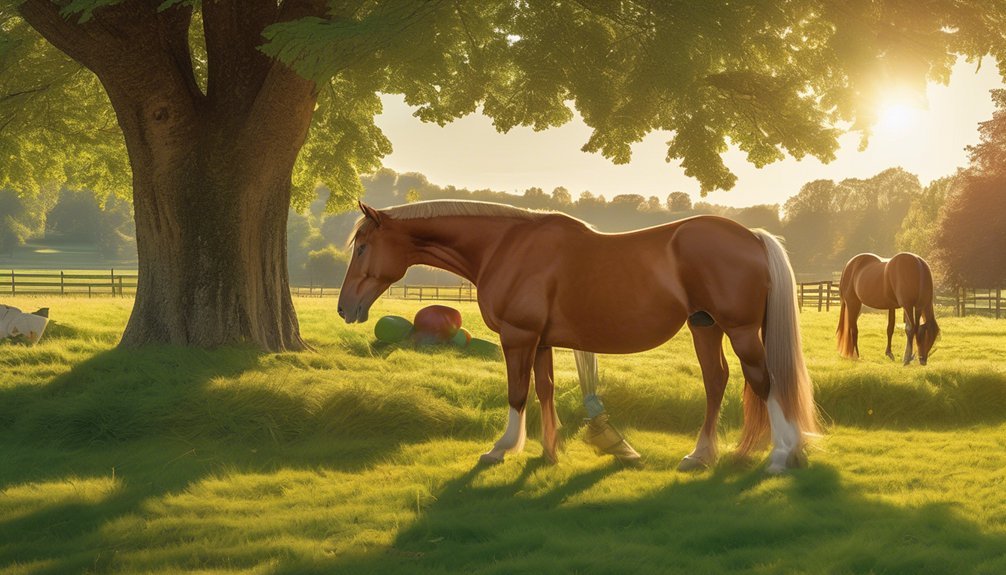
Just as a well-oiled machine relies on the right fuel, your horse's health hinges on a proper diet, particularly one rich in fiber. This essential nutrient aids digestion, promotes gut health, and can prevent serious issues like colic and laminitis. Understanding the unique dietary needs of your horse can be crucial, especially if it faces metabolic challenges or limited pasture access. What factors should you consider when transitioning to a high-fiber regimen?
Key Takeaways
- High-fiber diets promote digestive health by ensuring proper gut motility and fermentation, reducing the risk of colic and laminitis.
- Certain breeds, like Arabs, are more susceptible to digestive issues, making a high-fiber diet essential for their well-being.
- Fiber generates volatile fatty acids, providing energy and maintaining stable stomach pH, which prevents acid buildup.
- Horses with metabolic disorders, such as EMS and Cushing's disease, require high-fiber diets to manage insulin and glucose levels effectively.
- Regular high-fiber intake supports a balanced gut microbiome, enhancing nutrient absorption and overall health in horses.
The Importance of Fiber in Equine Nutrition
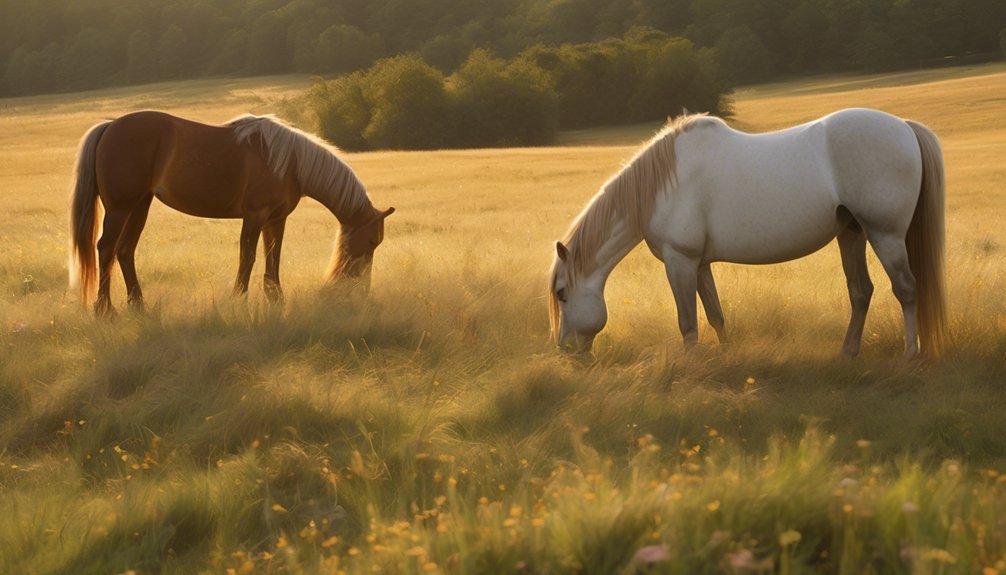
While you might think of protein and sugars as the main components of a horse's diet, fiber plays a crucial role in maintaining their overall health and well-being.
Adequate fiber intake is essential for promoting digestive health, as it encourages proper gut motility and fermentation. Horses thrive on high-fiber diets derived from sources like hay, pasture grasses, and certain grains.
These fiber sources not only support a healthy digestive system but also help prevent issues like colic and laminitis. By ensuring your horse receives enough fiber, you foster a balanced gut microbiome, which is vital for nutrient absorption.
Understanding Horse Digestion
Fiber-rich diets are fundamental for a horse's digestive process, which is both complex and highly specialized. Your horse's stomach is relatively small, allowing only limited food intake at a time.
However, their digestive system relies heavily on microbial fermentation in the cecum and colon, where fiber is broken down. This process generates essential volatile fatty acids, which are vital for energy.
A high-fiber diet promotes gastric health by maintaining a stable pH and preventing acid buildup, which can lead to discomfort. Additionally, fiber aids in the production of digestive enzymes, enhancing nutrient absorption.
Horses at Risk for Colic
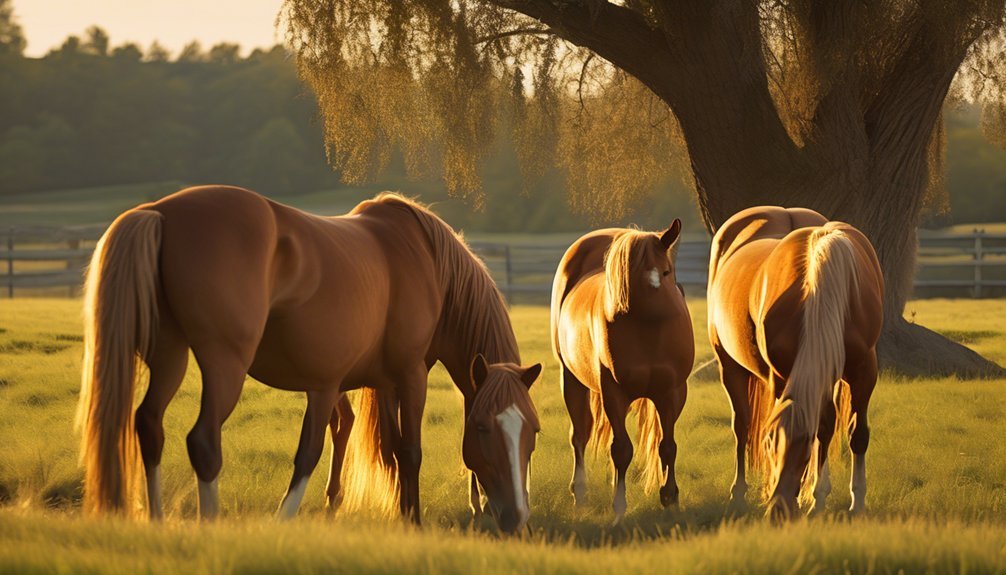
Understanding the factors that put horses at risk for colic is crucial for any horse owner. Certain breeds, feeding practices, and behavioral traits can increase susceptibility. Implementing colic prevention strategies, like a high-fiber diet, can significantly reduce the risk.
| Factor | Description | Impact on Colic Risk |
|---|---|---|
| Breed | Some breeds, like Arabs, are more prone. | Higher likelihood of colic episodes. |
| Feeding Practices | Irregular feeding schedules can stress horses. | Increases digestive upset. |
| Horse Behavior | Anxiety or changes in routine can trigger colic. | Stress negatively affects digestion. |
Metabolic Disorders and Dietary Needs
Colic isn't the only concern for horse owners; metabolic disorders also play a significant role in equine health. Conditions like Equine Metabolic Syndrome (EMS) and Cushing's disease can drastically affect your horse's well-being.
These disorders often stem from an imbalance in insulin and glucose levels, making dietary adjustments critical. High-fiber diets can help manage these conditions by promoting stable blood sugar levels and supporting digestive health.
Limited Access to Pasture
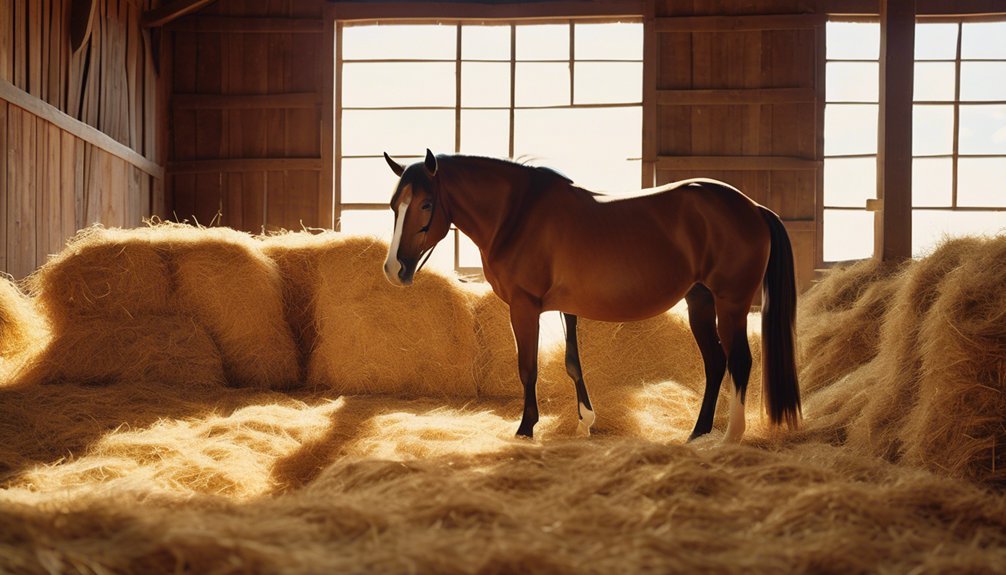
When horses have limited access to pasture, their nutritional needs can become challenging to meet. Without ample grazing, your horse may not receive enough fiber, which is crucial for digestive health.
You'll need to seek pasture alternatives that provide adequate fiber sources. Options like hay, especially grass hay, can serve as a primary substitute, but ensure it's high quality. You might also consider adding beet pulp or alfalfa to their diet for additional fiber.
Remember, the right balance is essential; too little fiber can lead to colic or other digestive issues. Regularly assess your horse's body condition and adjust their diet accordingly to ensure they thrive, even without constant pasture access.
Your attention to their needs makes all the difference.
The Role of Fiber in Weight Management
While many horse owners focus on calories and protein for weight management, fiber plays a crucial role in maintaining a healthy weight. Incorporating fiber into your horse's diet supports weight control by promoting satiety and encouraging proper digestion. Here's a quick overview of fiber benefits:
| Fiber Type | Benefit | Weight Control Impact |
|---|---|---|
| Soluble Fiber | Slower digestion | Increases fullness |
| Insoluble Fiber | Supports gut health | Prevents overeating |
| Fermentable | Provides energy | Aids in weight balance |
| Non-Fermentable | Enhances gut motility | Regulates intake |
High-Fiber Feed Options
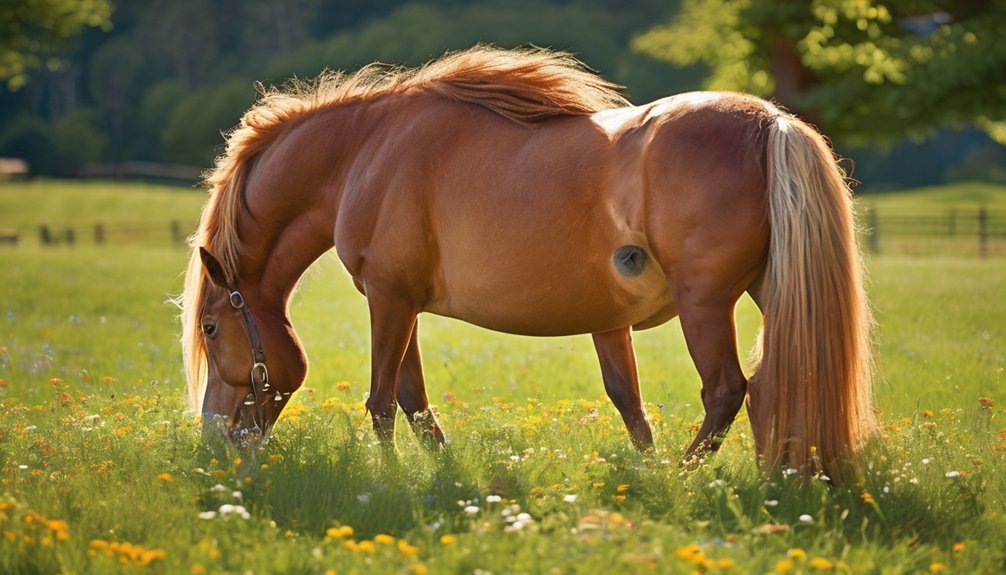
Incorporating high-fiber feed options into your horse's diet can significantly enhance their overall health and weight management. Start with various hay varieties like timothy, orchard grass, or alfalfa, as these provide essential fiber, vitamins, and minerals. Each type offers unique benefits, so consider your horse's specific needs.
Additionally, forage alternatives such as beet pulp, hay cubes, or chopped forage can supplement their intake, especially if your horse struggles with dental issues or has a lower appetite. These options not only promote digestive health but also help manage weight effectively.
Transitioning to a High-Fiber Diet
Transitioning your horse to a high-fiber diet requires careful planning to ensure digestive health and prevent any dietary disruptions.
Start by making gradual changes to their feed, introducing high-fiber options like hay, beet pulp, or specially formulated pellets. Begin with small portions, mixing in the new feed with their current diet over a week or two. This helps their digestive system adjust to the increased fiber content.
Monitor your horse's behavior and manure consistency during this period; any signs of discomfort may indicate the need for slower dietary adjustments.
Consistently offering fresh water and maintaining a regular feeding schedule will further support this transition, fostering a comfortable and healthy adaptation to their new high-fiber lifestyle.
Frequently Asked Questions
Can Horses Eat Too Much Fiber?
Yes, horses can eat too much fiber. Excessive fiber intake from sources like hay or pasture can lead to digestive issues. It's essential to balance their diet for optimal health and prevent complications.
What Are Signs of Fiber Deficiency in Horses?
Did you know that nearly 70% of horses suffer from digestive issues linked to inadequate fiber? If your horse shows signs like weight loss, colic, or poor coat condition, it might need better fiber sources for optimal digestive health.
How Does Fiber Affect a Horse's Mood?
Fiber affects your horse's mood by promoting healthy digestion. When fiber digestion is efficient, your horse experiences increased energy and stability, enhancing overall well-being. The benefits of fiber contribute to a calmer, more content equine companion.
Are There Any Fiber Supplements for Horses?
Yes, there are fiber supplements for horses, like beet pulp and alfalfa hay. These fiber sources promote digestive health, helping your horse maintain energy levels and overall well-being, ensuring they feel their best every day.
Can High-Fiber Diets Prevent Horse Obesity?
Yes, high-fiber diets offer significant benefits for obesity prevention in horses. By promoting healthy digestion and regulating weight, you help your horse maintain a balanced lifestyle, reducing the risk of obesity-related health issues.
Conclusion
In the grand tapestry of equine health, fiber acts as a vital thread, weaving together digestive stability and overall well-being. By prioritizing a high-fiber diet, you're not just feeding your horse; you're nurturing a resilient gut, preventing colic, and safeguarding against metabolic disorders. As you transition their diet, remember that each strand of fiber supports not only their health but also the vibrant bond you share. Together, let's cultivate a thriving equine life, rich in vitality and balance.



